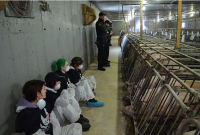Support strong Canadian climate journalism for 2025
Ag-gag laws are anti-whistleblower laws that criminalize the documentation and exposure of activities in animal agricultural facilities without the owner's consent. Their goal is to cover up issues in our food system, and they have far-reaching consequences for transparency and oversight.
By silencing whistleblowers, ag-gag laws add to the existing veil of secrecy around the animal agriculture industry, further shielding it from public scrutiny and impeding the identification of potential issues, such as animal cruelty, environmental violations, poor working conditions and food safety hazards.
A handful of ag-gag laws exist in the U.S., and they face substantial criticism from various quarters. Critics argue these laws violate First Amendment rights, stifling free speech and chilling investigative journalism. The conflict between corporate interests (most farms in the U.S. and Canada are intensive, concentrated operations) and the public's right to information and free expression has led to several legal battles, with organizations challenging the constitutionality of ag-gag laws in several states.
Most proposed ag-gag bills have been rejected, six states have already struck down such laws, and three of the six that still have ag-gag laws are currently facing legal challenges. Courts almost always rule that these laws restrict protected speech. They have wasted hundreds of thousands of dollars of taxpayer money and have been voted down by representatives on both sides of the aisle.
Even though these laws are facing extensive legal and ethical scrutiny south of the border, some believe they should be enacted in Canada. Conservative MP John Barlow’s private member’s Bill C-275 passed second reading in June and was referred to the Standing Committee on Agriculture and Agri-Food for further study. The committee voted to move the bill forward on Oct. 16.
Titled "An Act to Amend the Health of Animals Act (biosecurity on farms)," Bill C-275 actually has very little to do with biosecurity. It is a thinly veiled trespass law that would hinder the exposure of issues related to animal welfare, workers' rights, food safety and environmental protection. The experience of ag-gag laws in the U.S. should be a lesson to lawmakers in Canada about the importance of considering the broader democratic values at stake when contemplating legislation that restricts access to information and limits freedom of expression.
In Canada, regulations guiding the treatment of animals on farms are notably absent. The National Farm Animal Care Council (NFACC), which is largely comprised of animal agriculture interest groups, produces codes of practice for the care and handling of farm animals. The codes detail non-regulatory requirements and recommendations for good animal care on farms, and they are enforced by the industries to which they pertain.
There are no Canadian laws mandating transparency in animal farming operations, and to make matters worse, the existing animal welfare regulations for transport and slaughter are lacking and suffer from a significant enforcement gap. In a climate where Canadians are concerned about animal welfare, public health, employment standards and environmental protection, the call for transparency and oversight is not merely important but increasingly vital.

Bill C-275 is falsely presented as a measure to bolster biosecurity, purporting to shield animals from exposure to diseases and toxic substances. However, it ignores the reality of disease outbreaks.
Research indicates that biosecurity lapses and disease outbreaks are almost always linked to risky farming practices that stem from the actions of farm owners and operators rather than whistleblowers. However, Bill C-275 targets only the latter group.
To effectively tackle biosecurity concerns, the government should establish clear legal standards for on-farm operations and the treatment of farm animals, ensuring robust enforcement through on-farm inspections and surveillance, such as CCTV with public streaming.
With proper regulation and transparency, biosecurity risks could be significantly diminished and the need for undercover journalism and whistleblowing on factory farms would become obsolete. The impact of undercover investigations across North America cannot be overstated.
They have directly led to some of the largest contaminated meat recalls and prompted the closure of several slaughterhouses due to egregious and inhumane animal handling practices. By hindering the ability of whistleblowers to reveal issues related to animal welfare, working conditions, food safety or environmental sustainability, Bill C-275 increases the likelihood that biosecurity concerns and other issues will go unnoticed.
Ag-gag laws curtail the fundamental right to free expression, which is unacceptable in a democratic country like ours. They criminalize whistleblowers for trying to shed light on what happens behind closed barn doors or in animal transport trucks. In the interest of preventing animal cruelty, protecting workers and our environment and ensuring food safety, factory farms should be required to be more transparent, not less.
Bill C-275 suggests that the industry has something to hide, and it therefore serves neither the public nor the industry it intends to protect. It raises serious concerns about the inner workings of Canada’s industrial agricultural sector and would compromise the very values that form the foundation of our society.
If our country truly values free expression and accountability, our laws should instead strive to protect whistleblowers and celebrate those who speak out to expose wrongdoing.
Riana Topan is senior campaign manager, farmed animal protection, with Humane Society International/Canada, which together with its affiliates is one of the largest animal protection organizations in the world. Riana works to protect animals on farms by advocating for higher-welfare practices, policies and regulations, and supports institutions like universities and hospitals in offering more plant-based food options.






Comments
Bill C-275 suggests that the industry has something to hide, and it therefore serves neither the public nor the industry it intends to protect.
John 3:20
For everyone who does wicked things hates the light and does not come to the light, lest his works should be exposed.